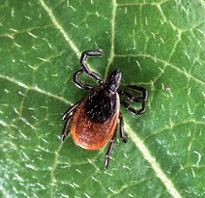Tick Borne Diseases Still Pose Threat to Residents
Poughkeepsie… As the weather continues to warm up, the Dutchess County Department of Behavioral & Community Health (DBCH) warns that ticks are becoming more active and residents should be taking precautions to prevent tick bites and reduce the risk of tick-borne diseases including Lyme Disease, Babesiosis, Powassan and other tick-borne diseases. Vigilance about tick bite prevention is critical as many residents are enjoying the outdoors for solitary activity, or with immediate household members, as they follow the “NYS on Pause” guidelines to stop the spread of Coronavirus.
Dutchess County Executive Marc Molinaro said, “As residents enjoy the outdoors, following the proper steps to prevent the spread of Coronavirus–household members only, social distancing and face coverings when encountering other people–it is important to also take tick prevention precautions so you can remain safe at home without the complication of tick-borne diseases. Remember, ticks don’t social distance, so check yourself to protect yourself whenever you spend time outdoors.”
To reduce the risk of contracting a tick-borne disease, residents are reminded to take the following precautions:
- Wear light-colored clothing with a tight weave to spot ticks easily.
- Wear enclosed shoes, long pants and a long-sleeved shirt. Tuck pant legs into socks or boots and shirt into pants
- Use an EPA registered insect repellent. The EPA has an online search tool to find the right insect repellent. Keep insect repellent easily accessible near the front door, in the shed, garage, or car to make sure it gets used consistently.
- Treat shoes, clothes and other outdoor gear with permethrin to help reduce tick bites.
- Check clothes and any exposed skin frequently for ticks while outdoors.
- Stay on cleared, well-traveled trails. Walk in the center of trails. Avoid dense woods and bushy areas. Ticks are mainly found in low-lying vegetation, therefore stay clear of leaf litter, brush and high grass whenever possible.
- Bathe or shower as soon as possible after going indoors (preferably within two hours) to wash off and more easily find ticks.
- Place clothes in the dryer on high heat for 30 minutes to kill any ticks lingering on the fabric.
- Do a final, full-body tick check at the end of the day (also check children and pets) and remove ticks promptly.
Behavioral and Community Health Commissioner Dr. Anil Vaidian said, “Containment and mitigation of Coronavirus is certainly what we are focused on, but just because one disease is posing a greater threat, doesn’t mean the others stop. Enjoying the outdoors is so important for our mental well-being, particularly during these challenging times. Taking the time for extra precautions to prevent tick bites will help protect you and your family from the stress and pain of tick-borne diseases.”
Family pets also need protection. Use veterinarian-recommended tick repellents for indoor/outdoor pets, such as an anti-tick collar. Prompt removal of any ticks that are found attached to a person or a pet decreases the risk of disease transmission. Remove attached ticks by using fine-tipped tweezers to grasp the tick as close as possible to where it is attached to the skin and pull straight out. To view a video demonstrating proper tick removal, as well as other important tick-borne disease prevention information, visit DutchessNY.gov/
For more information about tick-borne diseases, including prevention resources, visit https://www.dutchessny.gov/


